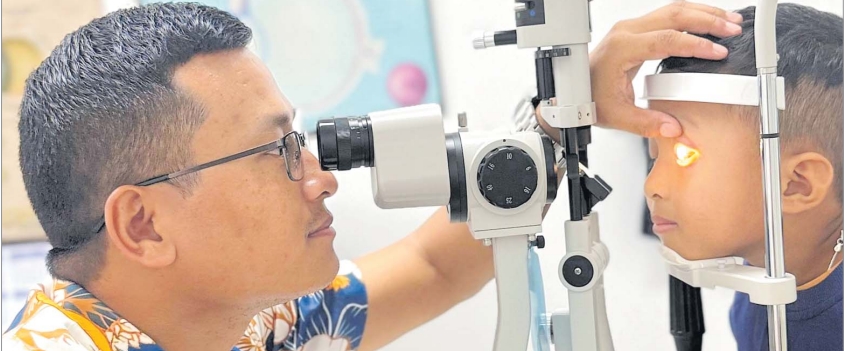VISION is one of the most valuable gifts a person can possess, yet sadly, many individuals overlook the importance of their eyesight and overall eye health.
The ability to see is a remarkable blessing, so it’s essential to give it the care it warrants to prevent blindness or worse outcomes.
This article presents tips for preserving our eyesight, as suggested and recommended by consultant optometrist Dr Ukash Manger from Asgar Optometrist’s Ba branch.
According to Mr Manger, a diet rich in specific nutrients is crucial for maintaining healthy vision and lowering the chances of developing diseases.
“To support eye health and slow vision loss, eat foods rich in vitamin A (carrots, leafy greens), lutein (spinach, eggs), and omega-3s (fish), Vitamin C, E, and zinc (citrus, nuts, seeds) also protect against age-related damage. Stay hydrated, eat fruits and vegetables, and avoid processed foods,” he shared with this newspaper.
Eating nourishing foods safeguards the eyes from harm, supports overall eye function, and may assist in preventing eye-related conditions.
Dr Manger suggested that to relieve digital eye strain for those who work on screens all day, one should adhere to the 20-20-20 rule every 20 minutes.
“Look at something 20 feet away for 20 seconds. Blink often to prevent dryness and adjust screen brightness, text size, and use blue light filters,” he said.
“Make sure your lighting reduces glare and position your screen an arm’s length away with the top at eye level or just below eye level.
“Take regular breaks to stretch and rest your eyes and consider blue light filter glasses if you use screens for long hours.”
Dr Manger said lifestyle choices — such as staying active, drinking enough water, getting adequate sleep and avoiding smoking — play a significant role in sustaining long-term eye health.
“Regular physical activity improves blood circulation, which helps deliver oxygen and nutrients to the eyes. It can also lower the risk of conditions like diabetes and high blood pressure that may harm vision.
“Stay hydrated. Drinking enough water keeps your eyes moist and helps prevent dryness and irritation. Get good sleep. Quality sleep allows your eyes to rest and recover. Lack of sleep can lead to blurry vision and eye fatigue.
“Avoid smoking. Smoking increases the risk of cataracts, macular degeneration, and optic nerve damage. Quitting helps protect your vision. These simple habits can go a long way in keeping your eyes healthy over time.”
Dr Manger recommends that individuals undergo a comprehensive (dilated) eye examination every one to two years.
“If you are over 60, it’s best to get an exam every year. If you have risk factors like diabetes, high blood pressure, or a family history of eye disease, you may need more frequent check-ups.
“Dilated exams help catch eye problems early, often before you notice symptoms. Regular exams are important to protect your vision.”
To maintain eyesight and reduce strain, Dr Manger suggests implementing several visual hygiene practices or eye exercises, ranging from palming to blinking.
“To reduce eye strain, try the 20-20-20 rule. This helps relax the eye muscles and prevents fatigue from prolonged screen use. Blink often to keep your eyes moist. Simple eye exercises, like shifting focus between near and far objects, can strengthen your eye muscles.
“Palming-covering your closed eyes with your palms helps relax and soothe tired eyes.
“Make sure to wash your hands properly before touching your eyes.
“These easy habits help protect your eyesight and reduce strain.”



